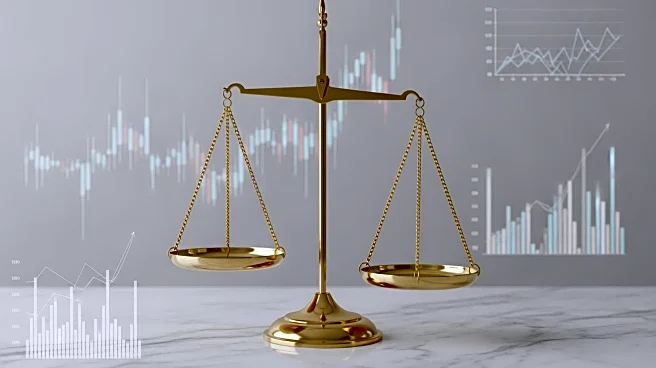What's Happening?
The Federal Reserve recently cut interest rates, lowering the benchmark overnight borrowing rate to a range of 3.75%-4%. This decision was anticipated by the market, but Federal Reserve Chair Jerome Powell
indicated that further cuts in December are not guaranteed. This has led traders to adjust their expectations, with the likelihood of a December rate cut dropping from 94% to 65%. The dollar has responded by reaching three-month highs, as the revised outlook has bolstered its value. Meanwhile, the pound has weakened following comments from the UK finance minister about upcoming economic challenges. The broader market sentiment has turned cautious, with stocks declining and safe-haven currencies like the yen and Swiss franc gaining strength.
Why It's Important?
The Federal Reserve's actions and statements significantly impact global financial markets. The uncertainty surrounding future rate cuts has strengthened the dollar, affecting international trade and investment flows. A stronger dollar can make U.S. exports more expensive and impact multinational companies' earnings. The shift in market sentiment also reflects broader economic concerns, as investors seek safer assets amid potential economic headwinds. The ongoing government shutdown in Washington, which has halted the release of official economic data, adds to the uncertainty, forcing investors to rely on non-official reports. This situation underscores the interconnectedness of global economies and the influence of U.S. monetary policy on international markets.
What's Next?
Market participants will closely monitor upcoming Federal Reserve meetings and economic data releases to gauge the likelihood of further rate cuts. The Fed's decisions will be pivotal in shaping market expectations and currency valuations. Additionally, the ongoing government shutdown may continue to obscure economic indicators, complicating the Fed's decision-making process. Internationally, the response of other central banks, such as the Bank of Japan, will also be crucial, as their policies can influence currency dynamics and trade relations. Stakeholders, including businesses and policymakers, will need to navigate these uncertainties to mitigate potential economic disruptions.









